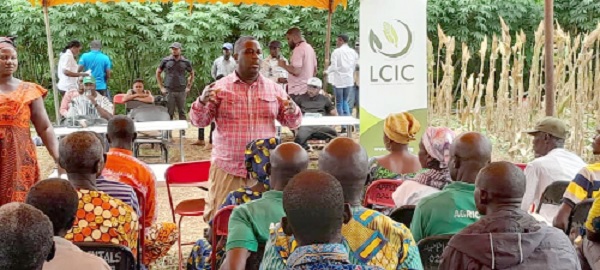
Fanteakwa North farmers endorse new maize varieties
Farmers in the Fanteakwa North District in the Eastern Region have expressed satisfaction with the yield of two new varieties of maize introduced in the area about a year ago.
They said the new varieties — Aburoo Legon (Legacy 2 white) and Legacy 26 yellow — when cultivated during the appropriate season, especially on May 8 every year, are capable of yielding approximately eight to nine tonnes per hectare, unlike the local maize (Abontem) which produce low yields.
The farmers expressed their satisfaction with the new varieties at a demonstration farm of the new varieties at Onuku Besea, one of the farming communities in the area.
The farmers were taken to the demonstration farm by the Executive Director of the Legacy Crop Improvement Centre (LCIC), a private company that improves maize cultivation, Dr Amos Azinu and the Fanteakwa North District Director of Agriculture, Pastor Solomon Anani Attipoe, to learn more about the new varieties.
Maturity
Dr Azinu and Ps Attipoe told the farmers that since they had realised the good yield of the new varieties, they should always plant the seeds of such varieties, which were capable of producing maize within three months.
Dr Azinu, who indicated that the new varieties were climate resilient, said this year, over 100 tonnes of such seeds had been sold locally.
He explained that on average, each farmer had been given 30 kilos of the new varieties for cultivation.
"Now that the farmers have realised the very high yield of the new varieties, I do not believe that our farmers will go back to the local seeds (Abontem) which cannot give so much yield,” he said.
Affordable seeds
“A farmer needs GH¢35 to get enough seeds of the new varieties to plant, so most of the farmers can afford to purchase," Dr Azinu stated.
Dr Azinu said Ghana had all the potential to produce enough maize for sale and consumption, but the lack of technology was hindering such a goal and that was why LCIC was changing the mode of production.
He was, therefore, hopeful that in the next five years, Ghana would have more commercial farms producing high-yielding varieties of maize.
That, he said, would ensure food security because Ghana would be able to feed the people.
Challenges
Ps Attipoe, for his part, said since he took over as Agric Director for the district, he had realised the farmers were facing a lot of challenges such as post-harvest losses, lack of storage facilities for farmers' produce, poor roads to convey produce to the marketing centres, as well as the purchase of the produce at low prices by market women.
Apart from that, he noted that herdsmen had been allowing their animals to destroy their farms.
Mr Attipoe indicated that his outfit was, however, trying to address such challenges to enable the farmers to fully benefit from their labour.
Farmers appreciation
Some of the farmers the Daily Graphic spoke to expressed satisfaction about the yield of the new varieties and stated that they would now cultivate such varieties.
One of the farmers who cultivated the new varieties of maize seeds, Jude Adinkraba-Appaw, said he was able to double his yield with the new varieties.
He advised colleague farmers to only cultivate the new varieties to make more income for themselves and their dependents.
Writer's email:
